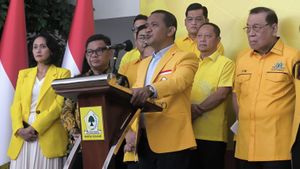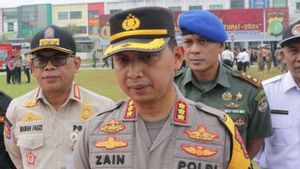JAKARTA - Australia and India have agreed to strengthen and deepen relations in various fields. The fields include economy, defense, investment, education, and research.
Prime Minister Anthony Albanese and Indian Prime Minister Narendra Modi issued a joint statement expressing their concerns over the conflict and humanitarian situation in Ukraine.
A statement posted on the Australian prime minister's official website said the two country leaders repeated calls for an immediate ceasefire and a peaceful settlement of the conflict.
"Conflict causes tremendous human suffering, exacerbating the vulnerability of the already bad global economic system," the statement said.
Albanese and high-level delegates completed their four-day visit to India on Saturday, after the two leaders held their first annual meeting on Friday under India-Australia Comprehensive Strategic Cooperation agreed in June 2020.
Based on 50 points of their joint statement, the two leaders also welcomed the Indian-Australian (ECTA) Economic Cooperation and Trade Agreement in December last year which emphasized opportunities to diversify and expand two-way trade.
The two also agreed on rapid progress in negotiations to complete the Comprehensive Economic Cooperation Agreement (CECA) between the two countries as quickly as possible.
The statement said that the two prime ministers highlighted the importance of strong bilateral trade and investment flows through a global supply chain that is diversified, transparent, open, secure, inclusive, and predictable.
"In this case, they welcomed the initiative to strengthen regional cooperation through the Indo-Pacific Economic Framework (IPEF) and the Supply Chain Resilience Initiative (SCRI) between India, Australia and Japan, and decided to further strengthen cooperation in the field," the statement read.
The two leaders also emphasized the importance of maintaining efforts to overcome climate change and welcoming the development of bilateral cooperation in the fields of science, technology, innovation and research.
Defense and Security
The two leaders also discussed ways to increase cooperation in the defense and security sectors, as support for the 2+2 Dialogue of the Ministry of Defense and Foreign Affairs and this year's defense ministers meeting.
Aware of the uncertain global security environment, the Prime Ministers underlined their firm commitment to strengthening Indian-Australian defense and security cooperation to address common challenges, and work towards an open, inclusive, stable and prosperous Indo-Pacific," the statement continued.
The two leaders also welcomed the scheduled joint defense exercise, Malabar 2023, in which Australia will host in August.
US, Indian and Japanese troops will also participate in the exercise.
The two prime ministers condemned terrorism and all forms of terror and manifestations and stressed the need to strengthen international cooperation to fight terrorism comprehensively and sustainably, the statement said.
The statement also mentioned the importance of fighting those who support and finance terrorism or provide protection for terrorists and terrorist groups, regardless of their motivation.
The two country leaders also renewed their commitment to support an open, inclusive, stable and prosperous Indo-Pacific by respecting sovereignty and territorial integrity and reaffirming the importance of complying with international law, particularly the United Nations Convention on Marine Law (UNCLOS), to face challenges to maritime rules-based order, including in the South China Sea.
The two prime ministers agreed to strengthen cooperation through Quad where Albanese would welcome Modi at the 2023 Quad Summit in Australia.
They also showed concern over the deteriorating situation in Myanmar and called for an immediate cessation of violence, the arbitrary release of those detained, access to humanitarian aid, resolution of problems through dialogue, and the transition to an inclusive federal democratic system in Myanmar.
They also condemned North Korea, which continues to launch ballistic missiles, urging it to comply with its obligations based on relevant UNSCR, and reaffirm its commitment to the country's full denuclearization.
The English, Chinese, Japanese, Arabic, and French versions are automatically generated by the AI. So there may still be inaccuracies in translating, please always see Indonesian as our main language. (system supported by DigitalSiber.id)













